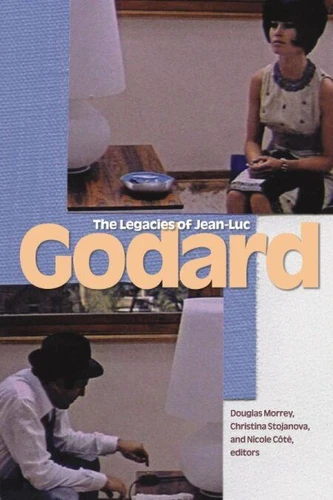The Legacies of Jean - Luc Godard
Par : , ,Formats :
Disponible dans votre compte client Decitre ou Furet du Nord dès validation de votre commande. Le format ePub est :
- Compatible avec une lecture sur My Vivlio (smartphone, tablette, ordinateur)
- Compatible avec une lecture sur liseuses Vivlio
- Pour les liseuses autres que Vivlio, vous devez utiliser le logiciel Adobe Digital Edition. Non compatible avec la lecture sur les liseuses Kindle, Remarkable et Sony
 , qui est-ce ?
, qui est-ce ?Notre partenaire de plateforme de lecture numérique où vous retrouverez l'ensemble de vos ebooks gratuitement
Pour en savoir plus sur nos ebooks, consultez notre aide en ligne ici
- Nombre de pages274
- FormatePub
- ISBN978-1-55458-922-7
- EAN9781554589227
- Date de parution15/10/2013
- Protection num.Digital Watermarking
- Taille3 Mo
- Infos supplémentairesepub
- ÉditeurWilfrid Laurier University Press
Résumé
The artistic impact of Jean-Luc Godard, whose career in cinema has spanned over fifty years and yielded a hundred or more discrete works in different media cannot be overestimated, not only on French and other world cinemas, but on fields as diverse as television, video art, gallery installation, philosophy, music, literature, and dance. The Legacies of Jean-Luc Godard marks an initial attempt to map the range and diversity of Godard's impact across these different fields.
It contains reassessments of key films like Vivre sa vie and Passion as well as considerations of Godard's influence over directors like Christophe Honoré. Contributors look at Godard's relation to philosophy and influence over film philosophy through reference to Wittgenstein, Deleuze, and Cavell, and show how Godard's work in cinema interacts with other arts, such as painting, music, and dance. They suggest that Godard's late work makes important contributions to debates in memory and Holocaust Studies.
The volume will appeal to a non-specialist audience with its discussions of canonical films and treatment of themes popular within film studies programs such as cinema and ethics. But it will also attract academic specialists on Godard with its chapters on recent works, including Dans le noir du temps (2002) and Voyage(s) en utopie (2006), interventions in long-running academic debates (Godard, the Holocaust, and anti- Semitism), and treatment of rarely discussed areas of Godard's work (choreographed movement).
It contains reassessments of key films like Vivre sa vie and Passion as well as considerations of Godard's influence over directors like Christophe Honoré. Contributors look at Godard's relation to philosophy and influence over film philosophy through reference to Wittgenstein, Deleuze, and Cavell, and show how Godard's work in cinema interacts with other arts, such as painting, music, and dance. They suggest that Godard's late work makes important contributions to debates in memory and Holocaust Studies.
The volume will appeal to a non-specialist audience with its discussions of canonical films and treatment of themes popular within film studies programs such as cinema and ethics. But it will also attract academic specialists on Godard with its chapters on recent works, including Dans le noir du temps (2002) and Voyage(s) en utopie (2006), interventions in long-running academic debates (Godard, the Holocaust, and anti- Semitism), and treatment of rarely discussed areas of Godard's work (choreographed movement).
The artistic impact of Jean-Luc Godard, whose career in cinema has spanned over fifty years and yielded a hundred or more discrete works in different media cannot be overestimated, not only on French and other world cinemas, but on fields as diverse as television, video art, gallery installation, philosophy, music, literature, and dance. The Legacies of Jean-Luc Godard marks an initial attempt to map the range and diversity of Godard's impact across these different fields.
It contains reassessments of key films like Vivre sa vie and Passion as well as considerations of Godard's influence over directors like Christophe Honoré. Contributors look at Godard's relation to philosophy and influence over film philosophy through reference to Wittgenstein, Deleuze, and Cavell, and show how Godard's work in cinema interacts with other arts, such as painting, music, and dance. They suggest that Godard's late work makes important contributions to debates in memory and Holocaust Studies.
The volume will appeal to a non-specialist audience with its discussions of canonical films and treatment of themes popular within film studies programs such as cinema and ethics. But it will also attract academic specialists on Godard with its chapters on recent works, including Dans le noir du temps (2002) and Voyage(s) en utopie (2006), interventions in long-running academic debates (Godard, the Holocaust, and anti- Semitism), and treatment of rarely discussed areas of Godard's work (choreographed movement).
It contains reassessments of key films like Vivre sa vie and Passion as well as considerations of Godard's influence over directors like Christophe Honoré. Contributors look at Godard's relation to philosophy and influence over film philosophy through reference to Wittgenstein, Deleuze, and Cavell, and show how Godard's work in cinema interacts with other arts, such as painting, music, and dance. They suggest that Godard's late work makes important contributions to debates in memory and Holocaust Studies.
The volume will appeal to a non-specialist audience with its discussions of canonical films and treatment of themes popular within film studies programs such as cinema and ethics. But it will also attract academic specialists on Godard with its chapters on recent works, including Dans le noir du temps (2002) and Voyage(s) en utopie (2006), interventions in long-running academic debates (Godard, the Holocaust, and anti- Semitism), and treatment of rarely discussed areas of Godard's work (choreographed movement).



